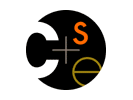
|

CSE 401, Au '06: Introduction to Compiler Construction |
|
 CSE Home CSE Home |
 About Us About Us |
 Search Search |
 Contact Info Contact Info |
|
Project: The project involves turning a toy compiler into an (almost) real one. You will work in teams of 2. Each project milestone will be graded on correctness, coding style, and completeness of test cases. See assignment links for details. Evaluation
Late Policy
Text: Required: Cooper & Torczon, Engineering a Compiler. Also useful are Aho, Sethi, & Ullman, Compilers: Principles, Techniques, and Tools (new edition 2007, older ed. 1986), and Appel, Modern Compiler Implementation in Java (2nd ed., source of the MiniJava project) Catalog Description: Fundamentals of compilers and interpreters; symbol tables, lexical analysis, syntax analysis, semantic analysis, code generation, and optimization for general purpose programming languages. No credit to students who have taken 413. Exams: The final exam is December 14. The midterm is tentatively scheduled for November 3 (any change to this date will be announced well in advance). Academic ConductCheating is a very serious offense. If you are caught cheating, you can expect initiation of a cheating case in the University system. Cheating is an insult to the instructor, to the department and major program, to your colleagues, and most importantly, to you. If you feel that you are having a problem with the material, or don't have time to finish an assignment, or have any number of other reasons to cheat, then talk with the instructor. Copying others' work, from this or previous quarters is not the solution. To avoid creating situations where copying can arise, never e-mail or post your solution files. You can post general questions about interpretation and tools but limit your comments to these categories. If in doubt about what might constitute cheating, send the instructor email describing the situation. For more details see the Academic Misconduct web page. Portions of the CSE 401 Web may be reprinted or adapted for academic nonprofit purposes, providing the source is accurately quoted and duly credited. The CSE 401 Web: © 1993-2006, Department of Computer Science and Engineering, University of Washington. |
|||||||||||||||||||||||||||||||||||||||||||||||||||||||||||||||||||||||||||||||||||||||||
|
Computer Science & Engineering University of Washington Box 352350 Seattle, WA 98195-2350 (206) 543-1695 voice, (206) 543-2969 FAX [comments to nkuchta] | |